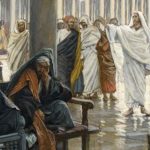Fr Gilbride’s Homily
March 21st, 2021 – MHM
Today we begin Passiontide: we have entered the final stretch of Lent before Easter. The liturgical focus now shifts towards our Lord’s impending betrayal, arrest, and suffering. Hence the name for today’s Mass, Passion Sunday, with the word passion coming from the Latin word for suffering. In the last line of today’s Holy Gospel we heard the following: ‘They took up stones therefore to cast at Him’. His opponent’s animosity had grown such that they no longer had self-control over their anger. No longer was it just murmuring, or positing malicious questions designed to catch Him out. Now his opponents picked up stones to cast at Him. But why stones? Because stoning was the punishment for those who committed the sin of blasphemy, and our Lord Jesus Christ had, only a moment prior to this, said the following words: ‘Amen, amen I say to you, before Abraham was I AM’. The words I AM in Hebrew was part of the title by which God revealed Himself to Moses at the Burning Bush. It was such a holy name that no one could utter it except the High Priest once a year while offering sacrifice to God in the inner most sanctuary of the Temple. “At no other time, at no other place, and by no other person could it be said, but here Jesus of Nazareth, with full conviction, pronounces the title of God and applies it to Himself. ”We are less than two weeks away from Good Friday, the climax of the conflict that we see in today’s Gospel. In a commentary on the Passion, the venerable Bishop Fulton Sheen once said that at the foot of the Cross stood three kinds of people: those with a spirit of sympathy for our Lord, those with a spirit of antipathy, and those with apathy.
The first group, the sympathetic, were the pious women of Jerusalem; His mother Mary, St John the Apostle, Joseph of Arimathea, Simon of Cyrene, the Good Thief and others. They did not abandon our Lord while He hung on the Cross; instead, they shared His pain. The word sympathy means to ‘suffer with’. It is not simply a nice feeling or friendly disposition we have towards someone else; real sympathy costs something. The sympathetic souls stood out in a public place to suffer with Christ. Their witness and support for Him, even if it was an entirely silent witness, would have incurred the reproach of others, yet they remained and suffered with.
The second class of people were the antipathetic. These were the souls who openly mocked or scoffed at Christ. In their blindness, they were happy to see love personified die for a crime He did not commit.
The third group were those who expressed apathy. This word means indifference, unemotional, neither here nor there, lukewarm. This group included many inhabitants of the city: shop owners closing before the Sabbath, those running an errand, or rushing home before the weekend. Upon hearing of the crucifixion of Jesus, some might have said to themselves: “well, that’s sad for Him and His followers, but what is that to me, I have my own problems to attend to.” These apathetic souls were not hostile to Christ, but neither were they sympathetic because they were not willing to share his pain and stand with Him. The greatest event in all human history elicited three responses: those who loved, those who mocked, and those who did not care.
Today is the Day of the Unborn Child. Mass is being offered at St Mary’s Cathedral, followed a rosary procession at 12pm. Every year thousands of unborn babies in this country are condemned for a crime they did not commit. The loss of their lives is the greatest social injustice in our society that inflicts enormous harm on so many people. But like our Lord’s crucifixion, the daily tragedy in Australia is met with three responses. Those who suffer with the children & mothers, there are those who mock or vilify the pro-lifers, and those who simply do not care.
The public prayer for life is not a protest, just like the faithful followers at the foot of the Cross were not protesting. The street procession is a stand for something, and with someone. We stand for the dignity of every single human life, and with those who suffer from this great injustice.
But the truth has a habit of being divisive; some people do not want to hear the truth and rebel against it. As we read in today’s Gospel, our Lord was vilified and abused for speaking the truth, so too those who speak the truth on pro-life causes are vilified.
Those who engage in pro-life activism should not be provocateurs, nor should they seek to antagonise or condemn others. From the cross Christ prayed “Father, forgive them for they know not what they are doing”. And so, we pray the same prayer for those who oppose us.
Souls are won for Christ when we proclaim the truth without fear. Christ spoke the truth, and while He was persecuted for it, at the foot of His Cross there were some unlikely individuals who came to believe in Him: the Roman soldier, the Good Thief, and Nicodemus the Pharisee. Some weeks later, at Pentecost, when St Peter preached the truth to the people of Jerusalem, three thousand believed and were baptised. Today, it is still our duty to proclaim the Catholic faith, and this includes social issues, which are the application of catholic moral principles to public life. And the pro-life cause is the single most important social issue today.
And what will the fruit be if we proclaim the truth about life? The more we make a stand for life, the more souls that will ultimately be won for Christ. The leading voices in the pro-life cause are Catholics, and it is no surprise that so many people have been led to the Catholic Church by their pro-life witness. One famous example is the former Planned Parenthood centre director, Abby Johnson.
So a final thought to ponder on this Passion Sunday, faced with a society that is increasingly antipathetic towards what we believe, we have two choices: retreat and hope they leave us alone, or go out and be witness for Christ and the truth. The word ‘witness’ in Greek is martyr. The early Christians suffered for their faith, not because they quietly went to Sunday Mass, performed their civic duties, and paid their taxes; they became martyrs because they stood for what was true in matters of faith and public morals. May God grant us the courage we need to be witnesses when it is our turn to make a stand whatever the particular issue might be.









